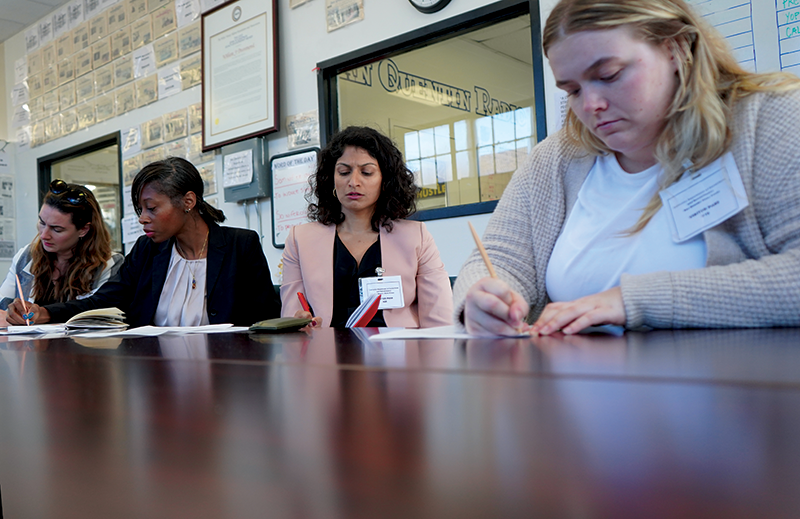Hillary Blout, founder and executive director of For the People, is leading an effort designed to bring district attorneys inside of California prisons to get a closer look at rehabilitation in action.
The organization helps people in prison with prosecutor-initiated resentencing, as well as educates prosecutors nationwide about the benefits of this approach. Prosecutor-initiated resentencing gives prosecutors discretion to recall prison sentences. Since its founding, For the People has helped facilitate the release of many incarcerated people with inordinate sentences who are now living successful lives in the outside world.

Blout and For the People staff attorneys Cassie Gazipura, Rhona Taylor and Puja Bhatia visited San Quentin’s Media Center in August to discuss the effort.
“I am here because the San Quentin News is basically the birthplace of this idea [of prosecutor-initiated resentencing],” Blout said.
She shared that former Editor-in-Chief Arnulfo Garcia had been serving an unreasonably long sentence under the Three Strikes Law before the Santa Clara County District Attorney fought to secure his release through resentencing. The kind of intervention was unheard of at the time and ultimately inspired Blout to begin working to promote prosecutor-initiated resentencing.
Assembly Bill 2942 first codified prosecutor-initiated resentencing into California law, making it the first-of-its-kind law in the nation. AB 2942 allows prosecutors to ask a court to revisit past sentences, determine whether further confinement is “in the interest of justice,” and facilitate a prison release when appropriate.
Troy Dunmore was released from San Quentin in October 2021 under a prosecutor-initiated resentencing thanks to For the People’s efforts.
“For the People has been with me since I paroled,” Dunmore shared. “I had a reentry person check on me, and I could call them if I needed any assistance. I [feel] like they had my back to this day.”
Dunmore said that when his mother passed away his parole officer was giving him a hard time about going to her funeral. With no hope left, he contacted Blout. Her organization made sure he could go and pay his last respects to his mother.
“Next thing I know, my parole officer showed up at [my] transitional house and handed me some papers authorizing me to go,” he said.
Since then, Dunmore has been working with the For the People to help convince more district attorneys that it’s worthwhile to review the past sentences and rehabilitative achievements of incarcerated people through prosecutor-initiated resentencing. He would still be in prison serving a 38-to-life term without the intervention of Blout and her team. Instead, Dunmore is living free and working as an alcohol and drug counselor during the day while attending college at night.
In 2021, Gov. Gavin Newsom signed legislation that included a three-year, $18 million dollar investment to expand prosecutor-initiated resentencing throughout the state. Nine counties signed up to participate in the pilot program ― Los Angeles, Santa Clara, San Francisco, Riverside, Contra Costa, San Diego, Yolo, Merced and Humboldt. Gov. Newsom provided an additional $8 million in funding for 2023.
“We would like to bring in as many prosecutors that are a part of this pilot so they can see what these programs look like, what rehabilitation looks like,” Blout told SQNews.
“Prosecutors see people on their worst day when they are at their lowest,” said Blout, who noted that some prosecutors don’t consider how people can change while serving time. “But the prosecutors’ job is to make sure they’re upholding justice.”
Blout believes that all prosecutors will eventually warm to the idea of prosecutor-initiated resentencing. She herself became a prosecutor in the hope of making a positive difference.
For The People will be bringing prosecutors from pilot counties inside San Quentin later this year to see what rehabilitation and transformation looks like.
“We believe that most incarcerated people can be rehabilitated and that every person in prison deserves an opportunity to have their case reviewed,” Blout wrote in their December 2021 handbook for prosecutors, adding that these opportunities shouldn’t only be given to offenses categorized as “non-serious” or “non-violent.”
“We know the possibilities of rehabilitation and redemption transcend these labels.”